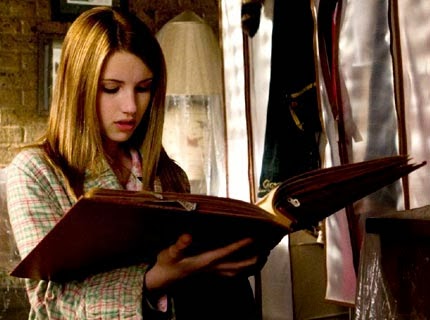Last time I wrote for the writing dimension, I discussed what the term 'archetypes' really means and I went through the first five of eleven journeys the hero of a story can take.
Archetypes can be applied to almost anything in stories; images, symbols, characters, plot patterns, ideas and even themes.
FUN FACT: Did you know that it's been proven that archetypes also show up in the dreams we have? Both daydreams and dreams that have while we're asleep.
This goes to show just how cool the psychology behind archetypes is.
Today, I'm gonna finish covering the types of journeys a hero can take. If you haven't read the first five, I have a link at the top of the post you can follow.
6. The journey in search of knowledge.
This can be used in mystery novels. Think about it: the character is trying to figure out who murdered the lady down the street, who set the bank on fire and so on. They’re trying to gain insight or knowledge in order to solve the mystery.
 |
| Emma Roberts as Nancy Drew |
The character could also be going out to get physical documents or files. In Elysium Max makes a deal with Spider in which he will retrieve certain documents in exchange for a trip up to Elysium where the life saving machine is. In this case, the documents aren't his only concern but they become a primary focus.
ex. Nancy Drew series, The Last Thing I Remember, Elysium
7. The tragic quest
For this quest, the character is trying to make things right again either with themselves emotionally or with someone else no matter how hard it is and whether or not they have to suffer. These stories are typically quite heartbreaking. Usually they have tragic endings and the character is just in rough shape emotionally and/or physically the whole time. Things for the main character are just generally terrible. Nothing seems to be going their way and yet they press on.
An exception for the tragic ending thing is The Patriot. Overall, it's a really sad story but the main character lives on tell the tale so to speak. While there's a lot of death throughout the movie, it was more of a 'bittersweet' ending.
ex. The Machinist, Road to Perdition, The Patriot
 |
| Jim Carey and Jeff Daniels in Dumb and Dumber |
8. The fool’s errand.
Another way of saying this is that a simple-minded person saves the land or the princess just because of their own unawareness to their foolishness.
I find this one particularly fun. You get those books where the character is just so quirky you have to love them. There can be a lot of humour in this quest.
An example of this is Shrek. Not necessarily Shrek himself but Donkey. Donkey saves Shrek's butt in the castle by sweet talking a dragon. I don't know about you but sweet talking a dragon is a dumb idea to me! Of course, Donkey didn't see this and ended up buying Shrek some time and indirectly saving the princess.
ex. Shrek, Dumb and Dumber
9. The quest to rid the land of danger.
I love this one because you can show just how small your character is compared to the huge task of ridding an entire land of danger. This quest ties in pretty well with number four so if you have this one, you probably also have that one. Not always, but often.
 |
| Bilbo in The Hobbit: The Desolation of Smaug |
This archetype could be anything from the eradication of a dictatorship to the slaying of a dragon. The great thing with this archetype is that the climax has the potential to have an epic battle in the end.
ex. The Bronze Bow, Mockingjay, The Hobbit
10. The grail quest (the quest for human perfection).
Let’s face it, no one will ever be perfect. But hey, it would make a good story if someone tried right? This is a really good inner battle that the character can have, especially if they’re under the impression that they can't make any mistakes or are already perfect.
The hero doesn't necessarily have to go in search of full out perfection. Maybe they're looking to be the best at something, or to live eternally. Maybe they're just part of a journey that takes a step towards making them a better person.
Is the movie A Thousand Words, Jack, a literary agent, really doesn't know when to keep his mouth shut. He goes through his own type of a grail quest. Not in the sense where he becomes perfect but he improves who he is as a person.
These quests can also include spiritual nourishment.
ex. A Thousand Words, Evan Almighty.
11. The question for fame and fortune.
Ever read one of those stories where a girl in high school really wants to be popular and noticed for once in her life? Or what about the athlete who is working his but off to make it big time in the Olympics? How about searching for treasure? Absolutely! I've read some great stories where the main character is looking for some sort of jackpot.
 |
| Cal (left) and Boges (right) in the TV adaptation of Conspiracy: 365 |
Usually in this archetype, the antagonists are after the exact same thing the protagonists are, they just have their own motives.
ex. Catch That Kid, Conspiracy: 365, National Treasure
So now that all the journeys have been covered, which one does your own novel or your favourite one fall under? Let me know in the comments below!

No comments:
Post a Comment